- Home
- Franklin W. Dixon
The Secret of the Lost Tunnel
The Secret of the Lost Tunnel Read online
Table of Contents
Title Page
Copyright Page
CHAPTER I - Double Warning
CHAPTER II - The General’s Enemies
CHAPTER III - Trouble on the Road
CHAPTER IV - Spies
CHAPTER V - Retracing History
CHAPTER VI - A Peculiar Professor
CHAPTER VII - The Search
CHAPTER VIII - An Important Lead
CHAPTER IX - A Trap
CHAPTER X - The Missing Rifle
CHAPTER XI - Pleasanton’s Bridge
CHAPTER XII - The Cap Box
CHAPTER XIII - Digging for Gold
CHAPTER XIV - A Bombardment
CHAPTER XV - A Shot in the Dark
CHAPTER XVI - An Old Safe
CHAPTER XVII - A Fresh Perspective
CHAPTER XVIII - A Final Clue
CHAPTER XIX - The Lost Tunnel
CHAPTER XX - The Plantation’s Secret
THE SECRET OF THE LOST TUNNEL
DIFFICULT assignments are nothing new to the Hardy boys and this one that takes them to the Deep South is particularly challenging. Their mission: to vindicate a long-dead Confederate general, disgraced during the Civil War because he was accused of stealing hidden gold belonging to a bank.
In a museum exhibiting relics of the Civil War, the brother sleuths find a puzzling clue that may help to clear the general’s name and pinpoint the location of the hidden gold. But a dangerous criminal and his cohorts are out to steal the treasure and constantly harass Frank and Joe and their pal Chet Morton.
Skillfully avoiding booby traps and flying bullets, the boys persevere in their perilous quest. The arduous search is full of surprises that will thrill all fans of the Hardy boys.
“Get out!” the man roared
Copyright © 1977, 1968, 1950 by Simon & Schuster, Inc.
All rights reserved. Published by Grosset & Dunlap, Inc., a member of The Putnam & Grosset
Group, New York. Published simultaneously in Canada. S.A.
THE HARDY BOYS® is a registered trademark of Simon & Schuster, Inc.
GROSSET & DUNLAP is a trademark of Grosset & Dunlap, Inc.
Library of Congress Catalog Card Number: 68-24655
eISBN : 978-1-101-07643-9
http://us.penguingroup.com
CHAPTER I
Double Warning
THE telephone in the Hardy home rang sharply as the clock struck four. Blond-haired Joe bounded into the hall and took the call.
“Fenton Hardy’s residence,” he said, and in answer to a query, “My father isn’t home. Will you leave a message?”
“This is Dr. Bush,” the man informed him in a deep voice. “You’re going to have a visitor. Watch your step and pay no attention to his story. He’s dangerous. He’s out of his mind.” The man spoke a few seconds longer, then hung up abruptly.
Puzzled, Joe returned to the living room.
“What’s the matter?” asked his dark-haired brother Frank, who was a year older.
“A General Smith is coming here. Dr. Bush, who just phoned, says the general’s crazy, and that we should pay no attention to him.”
Before Joe had a chance to explain further, the telephone rang again. He answered it.
“Hello?” Placing his hand over the mouthpiece, he whispered to Frank, “A woman—says she knows Dr. Bush.” Then into the instrument he said, “Yes. ... Yes. ... Why? ... Hello, hello!”
The click on the other end of the line was evidence the woman had ended the conversation.
“Who was she?” Frank inquired.
“Didn’t give her name,” Joe replied. “But listen to this. She said if we heard from a Dr. Bush we should call the police immediately.”
“Good night!” Frank exclaimed. “A mystery to solve before we even see the people involved in it!”
But puzzling situations were nothing new to the brothers. As sons of Bayport’s famous detective, Fenton Hardy, they had encountered many baffling cases, beginning with The Tower Treasure. In their most recent adventure, The Sign of the Crooked Arrow, Frank and Joe had successfully concluded an intriguing mystery.
Now the boys’ thoughts were interrupted by the sound of the front doorbell. Joe opened the door. Before him stood a man in the uniform of the United States Army. On his shoulder he wore the single star of a brigadier general.
“I’m General Smith,” he said. “I’d like to see Mr. Hardy.”
“Step in, please,” Joe said politely. He shot a quick glance at Frank, then surveyed the stranger carefully.
The general, whether mentally unbalanced or not, had all the bearing of a fine military man. He was of medium build and stocky, with a ruddy complexion, blue eyes, and red hair.
“My father’s not here,” Frank told him.
“That’s too bad. How is he?”
“Why—er—very well,” Frank replied.
“Wonderful man,” General Smith commented.
“You know him?” Joe asked.
“Surely. I came to speak to your father on a very important matter.”
“We could give him your message,” Frank offered. “I’m Frank, and this is my brother Joe. Dad’s been away. We expect him back some time today.”
General Smith walked into the living room and seated himself in Fenton Hardy’s favorite club chair, looking keenly at the boys.
“I’ll relate my story briefly,” the man said. “You can tell your father, in case he doesn’t get back before I return to Washington. It concerns a treasure buried during the Civil War. I want him to find it.”
Joe stole a glance at Frank. His brother looked puzzled as the man continued.
“My great-grandfather, a Confederate general,” he said, “was disgraced during the Civil War because he lost a bandoleer containing a special cap box made of silver.”
“Bandoleer?” Joe asked.
“Yes. A military shoulder strap. Today they contain cartridges. The old one my great-grandfather lost carried a small silver box which was a family heirloom.”
“What was so disgraceful about losing that?” Frank asked as he observed the man intently.
“The box contained no bullets,” the general explained. “But it did hold a secret which has remained unsolved to this day. You see, just before a certain battle, my great-grandfather called at the plantation of his cousin, Beauregard Smith, a wealthy planter and president of the local bank. Beauregard confided to my great-grandfather that if enemy troops got too close, he intended to bury his gold, together with that belonging to the bank.”
“What happened then?” Joe put in eagerly.
The man moved uneasily in his chair. “Just before the Battle of Rocky Run,” he went on, “an old slave from Beauregard Smith’s plantation ran into Great-grandfather’s headquarters. He handed him a sealed envelope moments before dropping dead from exhaustion.”
As the visitor stopped speaking, he sprang from his chair and paced rapidly toward the door.
“What’s he going to do now?” Frank wondered, recalling the telephone warning.
But the general turned sharply on his heel and walked back, continuing his story.
“My case concerns a Civil War treasure!” said General
Smith
“Great-grandfather had time only to glance at the message. It contained a series of numbers. Sounds crazy, I know.”
Joe gulped and looked at his feet.
“Across the face of the message,” the general proceeded, “were the letters C S A. But before Great-grandfather could study the numbers, scouts brought reports of the enemy’s approach, and Great-grandfather had to issue a call to arms. He hurriedly hid the message in the ammunition box. The op
posing sides joined in battle shortly afterward, and the fight continued into the night. In the darkness and confusion, the bandoleer and the cap box disappeared, and with them the secret.”
“Didn’t Beauregard Smith remember the message he had sent?” Frank asked.
The general stared absently at the boy, then went on, “He was killed defending his plantation. The place was cannonaded and burned to the ground.”
The general started to pace again.
“Beauregard Smith’s family was penniless, and in disgrace, too, because the bank’s gold was lost. They accused my great-grandfather of taking it for his own use!”
Joe gave a whistle. “Some accusation!”
At that moment the telephone rang again, startling the general and the boys. Frank leaped to answer. The caller was Dr. Bush.
“Has Smith arrived?” he asked abruptly.
“Hold on a moment,” Frank said.
In the silence that followed, Frank strained to hear any familiar sound that might identify the place from which the doctor was calling. In a second he was rewarded. The words “Two on a raft!” boomed in the distance. The voice of Pete down at Shorty’s Diner!
Frank beckoned to Joe and whispered, “Bush is at Shorty’s Diner. I’ll try to keep him talking while you get a look at him.”
Joe raced from the house and hopped into the brothers’ convertible. He drove speedily toward Shorty’s Diner, located a few blocks away in the downtown section of Bayport. Reaching it, he hastily parked, bounded up the front steps, and pushed open the door.
As the tempting aroma of sizzling hamburgers and coffee drifted to Joe’s nostrils, he glanced quickly toward the telephone booth at the end of the long counter. It was empty!
Slowly a rotund youth sitting on a stool swung around. In his hand he held half of a triple-decker sandwich.
“Hello, Joe,” he said. “What’s the big hurry?”
“Chet!” Joe exclaimed. “Did you see anybody come out of the phone booth a second ago?”
“Don’t rush me,” Chet pleaded, and bit into the sandwich.
Chet Morton, a pal of the Hardys, enjoyed eating, and did not like to be hurried while engaged in his favorite pastime. Joe was bursting with impatience as he watched Chet chew contentedly on the big mouthful.
“This is awful important,” Joe pleaded. “Not another bite, now.” He repeated the question.
Chet gulped, patted his lips with the white paper napkin, and said, “Sure I saw the guy. Came out of that booth so fast he bumped into me. I said ‘Look, mister, you almost knocked the sandwich out of my—!’ ”
“For Pete’s sake, Chet, cut out the gab! Where did he go?”
The stout boy wheeled around on the stool and pointed to the side door. “Thataway. What’s up, Joe?”
“Tell you later.” Joe raced through the door, then halted on the sidewalk. Chet lumbered after him.
“I think that’s him down the street there,” Chet volunteered. “He was tall and wore a dark suit. Carried a black bag.”
Without a word, Joe sped after the figure who was now a block away. The stranger glanced back, then broke into a trot. At that moment a black sedan slowed up at the corner. The man hopped in. Before Joe could catch up with him or get a look at the license plate, the car disappeared.
Joe turned dejectedly as Chet arrived on the scene. “Didn’t even get a good look at him,” Joe moaned.
“Is he a crook?” Chet asked, puffing.
“Maybe. Anyway, somebody asked us to get the police after him. I wish I hadn’t lost him.”
“Don’t worry, pal,” Chet piped up. “I figured this was another detective case, so I decided to help you.”
“How?” Joe blurted, a frown creasing his forehead.
“Surprise,” Chet replied. Then, for the first time, Joe noticed that his plump friend held an old camera in his hands.
“I took his picture,” Chet said proudly.
CHAPTER II
The General’s Enemies
CHET Morton grinned as he handed the battered camera to Joe. On the front mount was a telescopic lens.
“I got a telephoto snapshot,” Chet boasted.
“Are you sure?” Joe eyed the camera skeptically. “Where’d you get this?”
“At a pawnshop,” Chet explained. “Just because it’s secondhand doesn’t mean it’s junky.”
Joe examined the camera. The lens seemed good enough, but the camera body had been cracked, and was patched here and there.
“I hope it hasn’t any light leaks,” Joe said, handing the camera back to Chet. “I’d sure like to have a picture of that man!”
“Count on me,” Chet said as the two boys drove toward the Hardy home to develop the picture. “You fellows working on a mystery?”
Chet’s voice contained a note of apprehension.
The Hardy boys were his closest friends, and although Chet greatly enjoyed their companionship, he was always loath to participate in the risks they ran.
“I don’t know yet,” Joe replied, and explained hurriedly about the mysterious telephone calls.
At the house Frank met them at the door. “Did you find Dr. Bush?” he whispered excitedly.
Joe shook his head, then Frank explained in low tones that the man had ended their telephone conversation very abruptly.
After hastily introducing Chet to General Smith, Joe ushered his friend into the basement, where the Hardy boys had their darkroom.
“You’ll find developer and hypo under the bench, Chet. I hope the picture’s good.”
While Chet was busy removing the film from the old camera, Joe rejoined his brother and General Smith.
“I must say,” the general commented, “that you boys sure dash around.”
Frank apologized for the interruption and explained, “Our friend Chet’s a photographer and uses our equipment sometimes. Please go on with your story about the Civil War, General Smith.”
“Well, when my great-grandfather as well as my grandfather failed to clear up the mystery, my father took a hand, because the Beauregard Smith branch of the family still blame us for the loss of their fortune.”
Frank and Joe sat tensely on the edge of their chairs, listening.
“My father was a general, too,” their caller said. “The military tradition in the Smith family has been our pride for over a century. That’s why I’m determined to find the treasure!”
General Smith thumped the table beside him so hard the lamp on it teetered precariously. He jumped from his chair and again began to pace the room. The boys looked at each other in alarm. Seating himself, the general continued:
“After exhaustive work, my father was able to unearth the fact that the bandoleer had been stolen by a spy. Long after the war, when there was no longer need for secrecy, the story came out that an enemy soldier, named Charles Bingham, had entered my great-grandfather’s camp. He was seen during the battle, but later was reported missing.”
“And the secret of the buried gold with him?” Joe inquired excitedly.
“That’s right,” the general answered.
“You want Dad to help you find the hidden gold,” Frank assumed. “The only clue is Bingham, and you don’t know what happened to him.”
General Smith nodded. “I know it’ll be hard, but I have a lot of faith in your father’s reputation.”
“Dad’s the best detective in this part of the country,” Joe said. “You came to the right man. But Dad will want proof of your story before—”
The look which flashed across the general’s face was ample evidence Joe had said the wrong thing.
“Proof!” the man sputtered. His red hair fairly bristled.
“General Smith,” Frank said, “my brother meant no offense. After all, we haven’t seen your credentials.”
“Credentials!” the general shouted.
Suddenly the crackling atmosphere was interrupted by the click of a key, and the front door swung open. In strode Fenton Hardy.
�
�Dad!” Frank exclaimed, hurrying toward the tall, broad-shouldered detective.
“Boy! Are we glad to see you!” Joe cried out.
As Fenton Hardy entered the living room, General Smith made a sudden move toward him. “Fent Hardy!” he boomed.
To Frank and Joe’s amazement, their father stood stock-still a moment, then put out his hand, exclaiming:
“Jack Smith!”
Frank and Joe stared wide-eyed as their father and General Smith exchanged greetings.
As soon as he could, Joe took his father aside and whispered, “Dad, we were told the general is insane!” The boy quickly related what had happened.
The detective, recovering from the shock of the announcement, pondered for a second. Then he laughed heartily and put his arm around his son.
“Tell General Smith what you just told me, Joe.”
Upon hearing the insanity story, General Smith threw back his head and laughed heartily.
“It only goes to show you can’t tell who’s crazy. I’ve thought ever since I came here, Fenton, that your sons were acting rather peculiarly!”
Grinning like a couple of boys, Mr. Hardy and General Smith recalled the happy days they had spent together one summer in an officers’ training camp.
Frank turned to the general finally. “General Smith, have you any idea who Dr. Bush and the woman caller might be?”
“Not the faintest,” General Smith answered, a worried frown creasing his forehead.
“My guess is,” Mr. Hardy spoke up, “that Bush is no doctor and he’s using a fake name.” He turned to the general. “Did you tell anybody you were going to visit me?”
“Not a soul.”
“Did you make a memorandum that someone might have seen?”
“No. The only thing I did was write the letter.”
“Letter?”
“Yes. Don’t tell me you didn’t get it!”
The general said that he had made a quick trip down to Centerville, the town nearest the old Beauregard Smith plantation. While there, he had discovered that someone had been digging secretly on the property. At once he had decided to enlist Fenton Hardy’s help and had written him a letter.

 The Great Pumpkin Smash
The Great Pumpkin Smash Who Let the Frogs Out?
Who Let the Frogs Out? Return to Black Bear Mountain
Return to Black Bear Mountain A Treacherous Tide
A Treacherous Tide Bug-Napped
Bug-Napped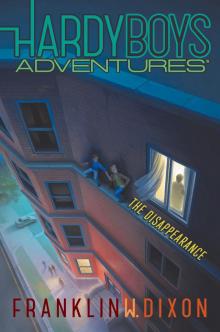 The Disappearance
The Disappearance Sea Life Secrets
Sea Life Secrets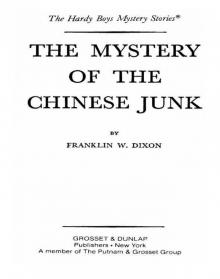 The Mystery of the Chinese Junk
The Mystery of the Chinese Junk A Skateboard Cat-astrophe
A Skateboard Cat-astrophe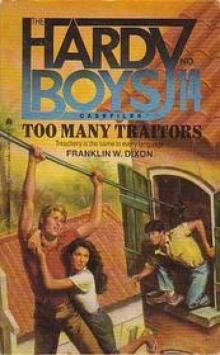 Too Many Traitors
Too Many Traitors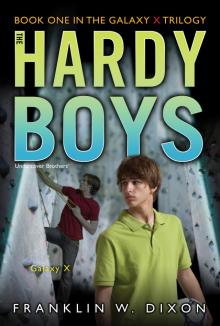 Galaxy X
Galaxy X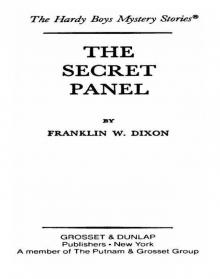 The Secret Panel
The Secret Panel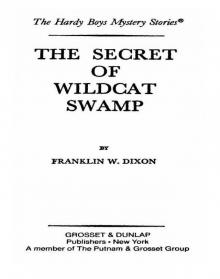 The Secret of Wildcat Swamp
The Secret of Wildcat Swamp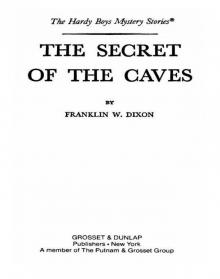 The Secret of the Caves
The Secret of the Caves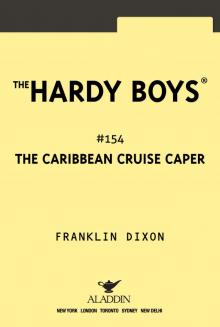 The Caribbean Cruise Caper
The Caribbean Cruise Caper Without a Trace
Without a Trace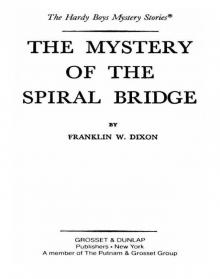 The Mystery of the Spiral Bridge
The Mystery of the Spiral Bridge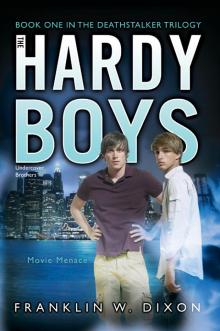 Movie Menace
Movie Menace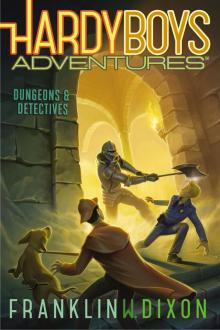 Dungeons & Detectives
Dungeons & Detectives Water-Ski Wipeout
Water-Ski Wipeout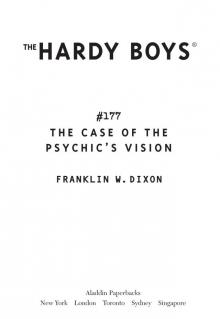 The Case of the Psychic's Vision
The Case of the Psychic's Vision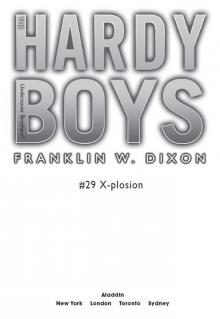 X-plosion
X-plosion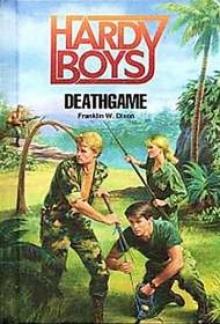 Deathgame
Deathgame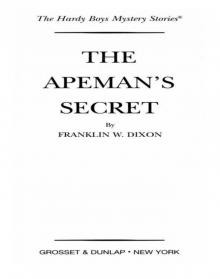 The Apeman's Secret
The Apeman's Secret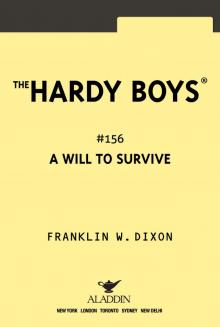 A Will to Survive
A Will to Survive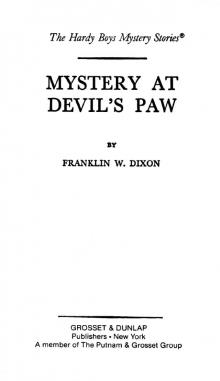 Mystery at Devil's Paw
Mystery at Devil's Paw Blood Money
Blood Money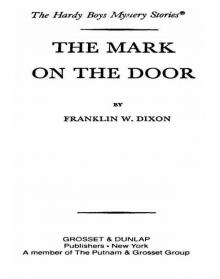 The Mark on the Door
The Mark on the Door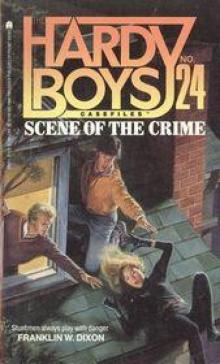 Scene of the Crime
Scene of the Crime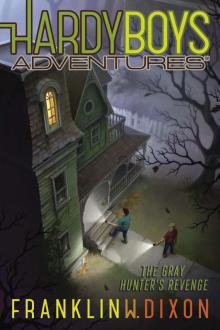 The Gray Hunter's Revenge
The Gray Hunter's Revenge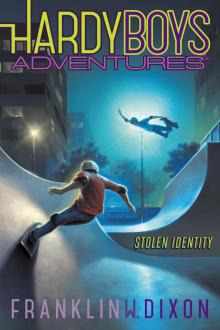 Stolen Identity
Stolen Identity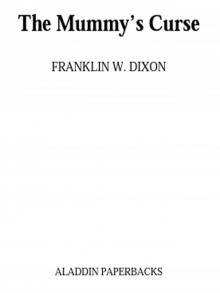 The Mummy's Curse
The Mummy's Curse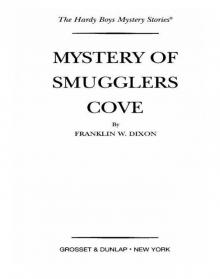 Mystery of Smugglers Cove
Mystery of Smugglers Cove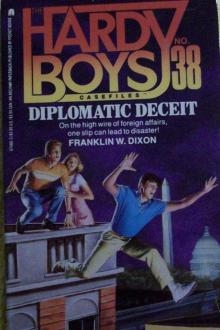 Diplomatic Deceit
Diplomatic Deceit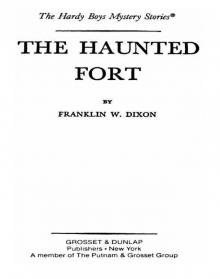 The Haunted Fort
The Haunted Fort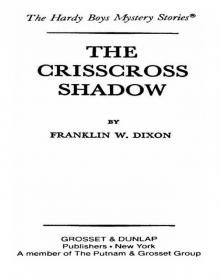 The Crisscross Shadow
The Crisscross Shadow Secret of the Red Arrow
Secret of the Red Arrow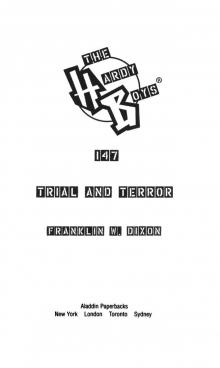 Trial and Terror
Trial and Terror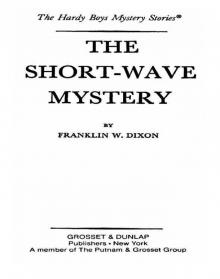 The Short-Wave Mystery
The Short-Wave Mystery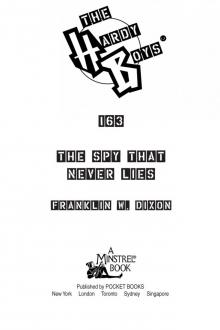 The Spy That Never Lies
The Spy That Never Lies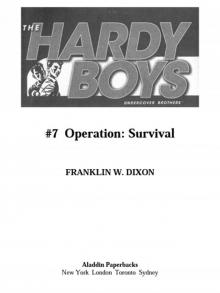 Operation: Survival
Operation: Survival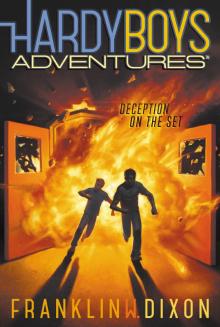 Deception on the Set
Deception on the Set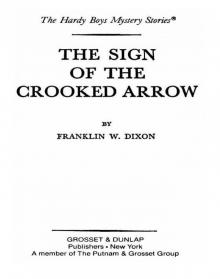 The Sign of the Crooked Arrow
The Sign of the Crooked Arrow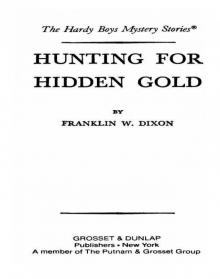 Hunting for Hidden Gold
Hunting for Hidden Gold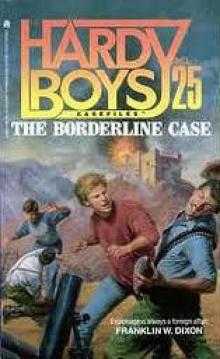 Disaster for Hire
Disaster for Hire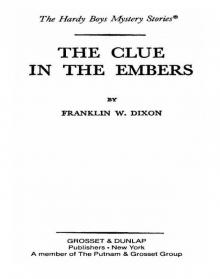 The Clue in the Embers
The Clue in the Embers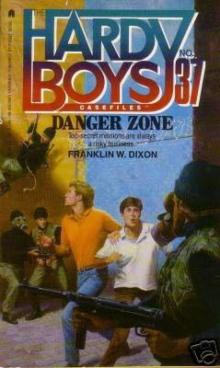 Danger Zone
Danger Zone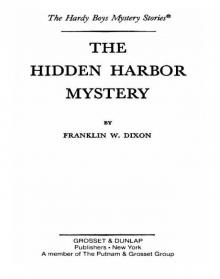 The Hidden Harbor Mystery
The Hidden Harbor Mystery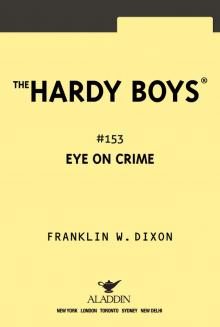 Eye on Crime
Eye on Crime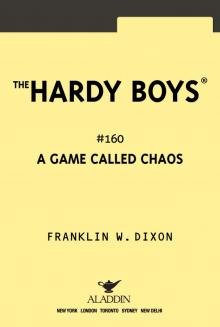 A Game Called Chaos
A Game Called Chaos The Bicycle Thief
The Bicycle Thief The Missing Playbook
The Missing Playbook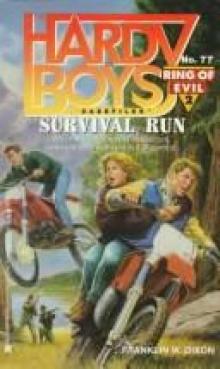 Survival Run
Survival Run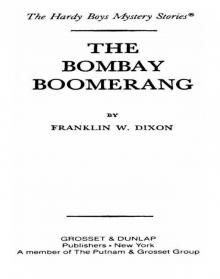 The Bombay Boomerang
The Bombay Boomerang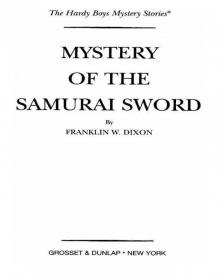 Mystery of the Samurai Sword
Mystery of the Samurai Sword Burned
Burned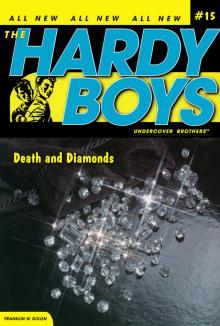 Death and Diamonds
Death and Diamonds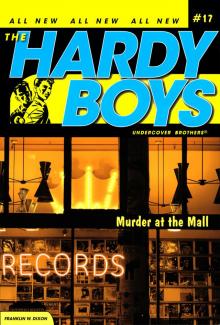 Murder at the Mall
Murder at the Mall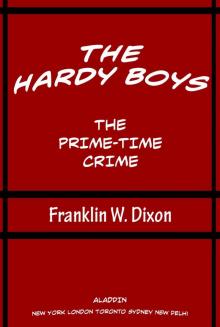 The Prime-Time Crime
The Prime-Time Crime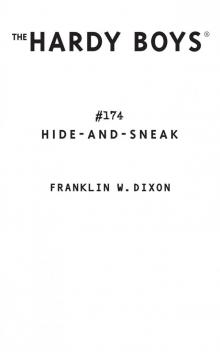 Hide-and-Sneak
Hide-and-Sneak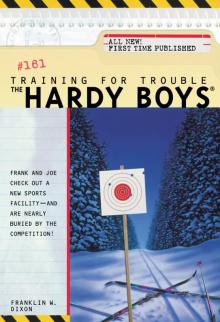 Training for Trouble
Training for Trouble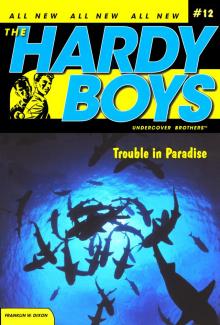 Trouble in Paradise
Trouble in Paradise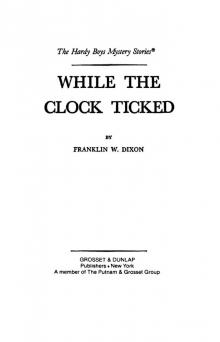 While the Clock Ticked
While the Clock Ticked The Alaskan Adventure
The Alaskan Adventure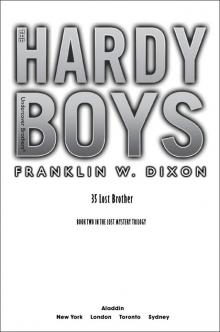 The Lost Brother
The Lost Brother Tunnel of Secrets
Tunnel of Secrets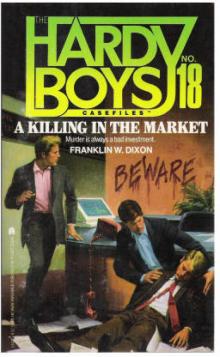 A Killing in the Market
A Killing in the Market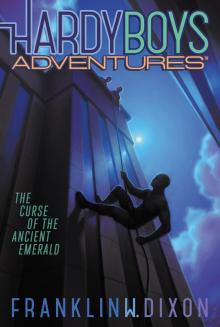 The Curse of the Ancient Emerald
The Curse of the Ancient Emerald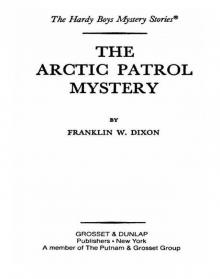 The Arctic Patrol Mystery
The Arctic Patrol Mystery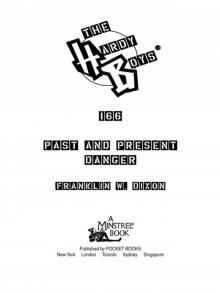 Past and Present Danger
Past and Present Danger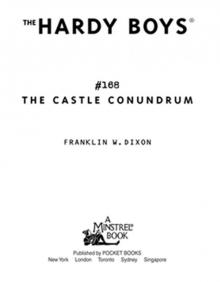 The Castle Conundrum (Hardy Boys)
The Castle Conundrum (Hardy Boys)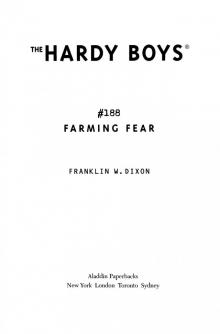 Farming Fear
Farming Fear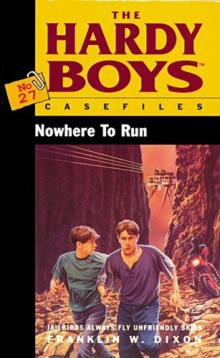 Nowhere to Run
Nowhere to Run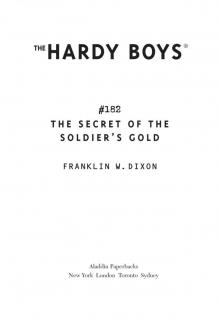 The Secret of the Soldier's Gold
The Secret of the Soldier's Gold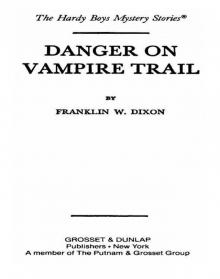 Danger on Vampire Trail
Danger on Vampire Trail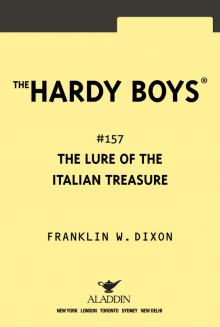 The Lure of the Italian Treasure
The Lure of the Italian Treasure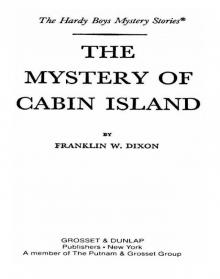 The Mystery of Cabin Island
The Mystery of Cabin Island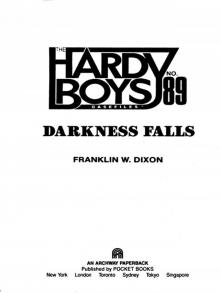 Darkness Falls
Darkness Falls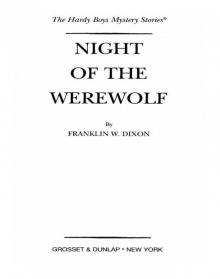 Night of the Werewolf
Night of the Werewolf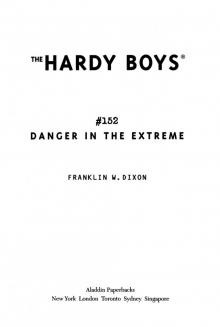 Danger in the Extreme
Danger in the Extreme The Lazarus Plot
The Lazarus Plot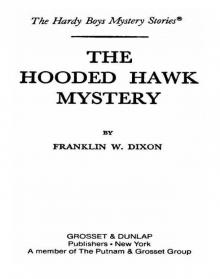 The Hooded Hawk Mystery
The Hooded Hawk Mystery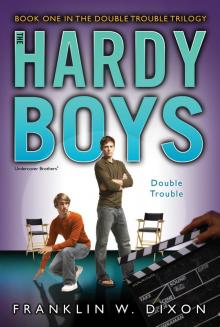 Double Trouble
Double Trouble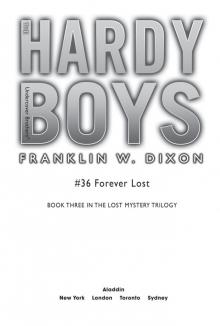 Forever Lost
Forever Lost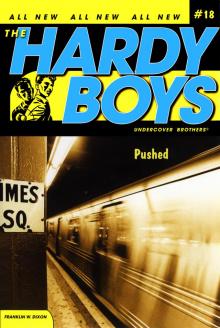 Pushed
Pushed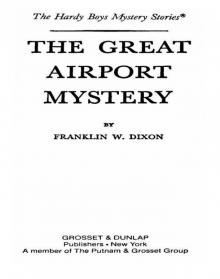 The Great Airport Mystery
The Great Airport Mystery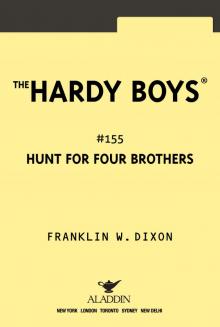 The Hunt for Four Brothers
The Hunt for Four Brothers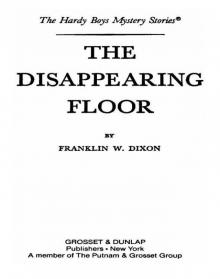 The Disappearing Floor
The Disappearing Floor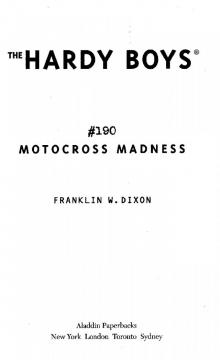 Motocross Madness
Motocross Madness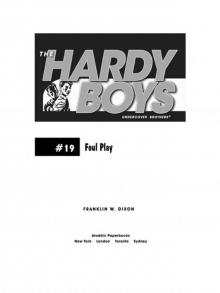 Foul Play
Foul Play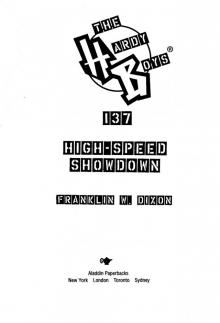 High-Speed Showdown
High-Speed Showdown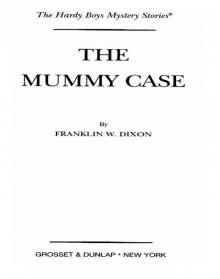 The Mummy Case
The Mummy Case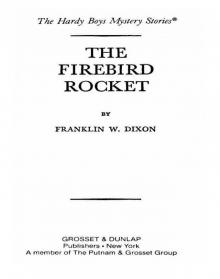 The Firebird Rocket
The Firebird Rocket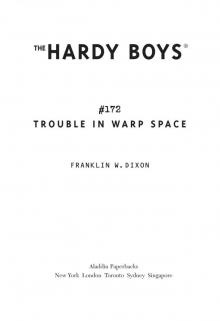 Trouble in Warp Space
Trouble in Warp Space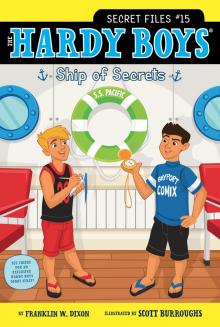 Ship of Secrets
Ship of Secrets Line of Fire
Line of Fire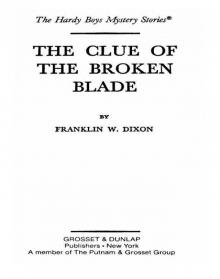 The Clue of the Broken Blade
The Clue of the Broken Blade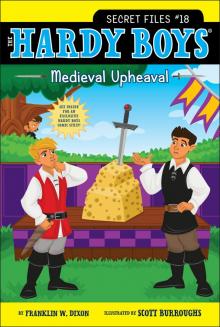 Medieval Upheaval
Medieval Upheaval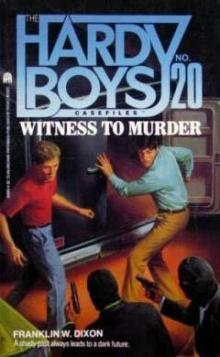 Witness to Murder
Witness to Murder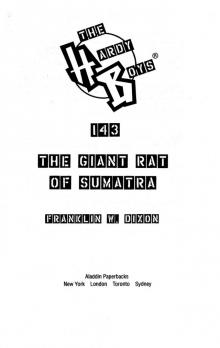 The Giant Rat of Sumatra
The Giant Rat of Sumatra Attack of the Bayport Beast
Attack of the Bayport Beast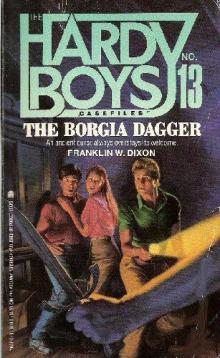 The Borgia Dagger
The Borgia Dagger Scavenger Hunt Heist
Scavenger Hunt Heist No Way Out
No Way Out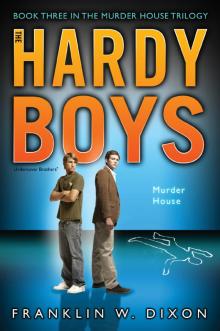 Murder House
Murder House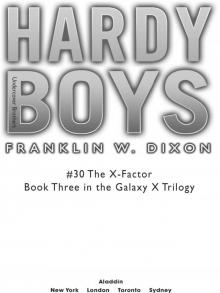 The X-Factor
The X-Factor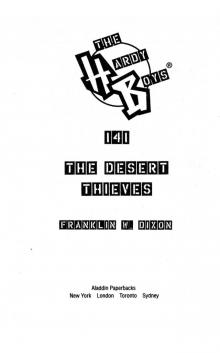 The Desert Thieves
The Desert Thieves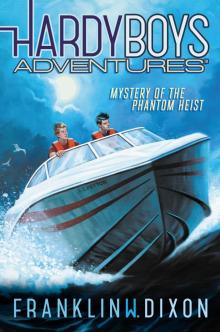 Mystery of the Phantom Heist
Mystery of the Phantom Heist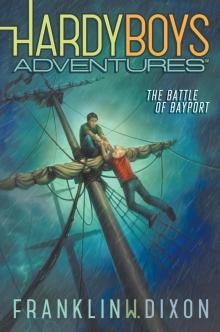 The Battle of Bayport
The Battle of Bayport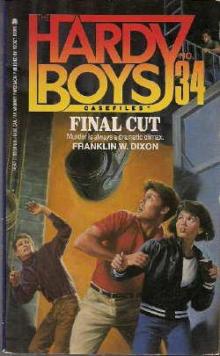 Final Cut
Final Cut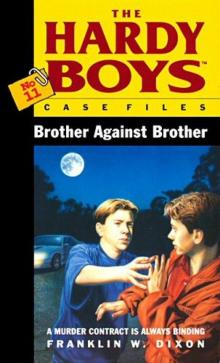 Brother Against Brother
Brother Against Brother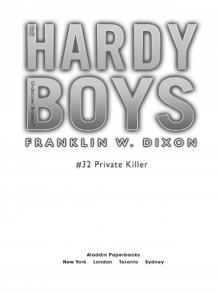 Private Killer
Private Killer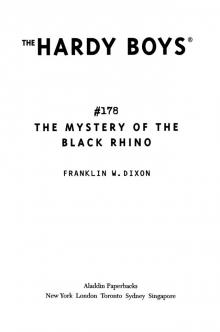 The Mystery of the Black Rhino
The Mystery of the Black Rhino Feeding Frenzy
Feeding Frenzy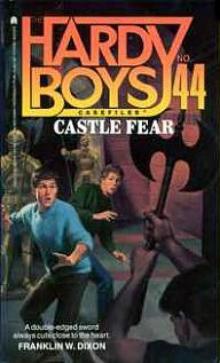 Castle Fear
Castle Fear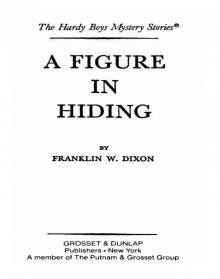 A Figure in Hiding
A Figure in Hiding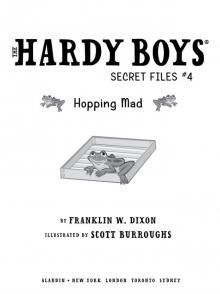 Hopping Mad
Hopping Mad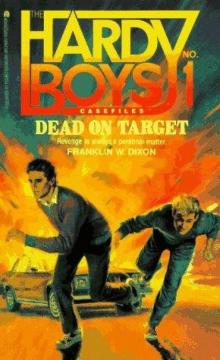 Dead on Target
Dead on Target Skin and Bones
Skin and Bones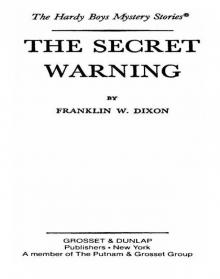 The Secret Warning
The Secret Warning Flesh and Blood
Flesh and Blood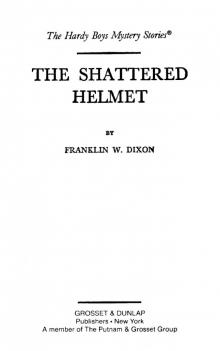 The Shattered Helmet
The Shattered Helmet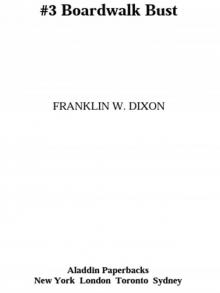 Boardwalk Bust
Boardwalk Bust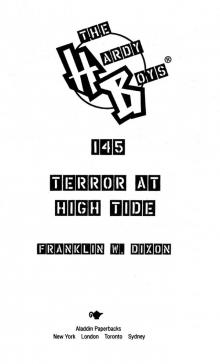 Terror at High Tide
Terror at High Tide In Plane Sight
In Plane Sight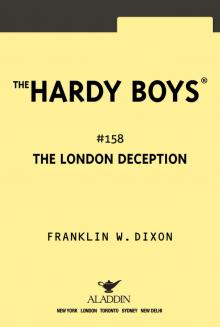 The London Deception
The London Deception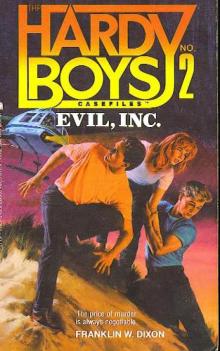 Evil, Inc.
Evil, Inc.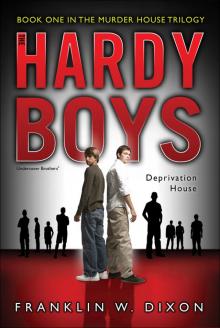 Deprivation House
Deprivation House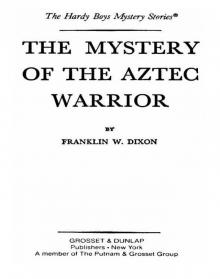 The Mystery of the Aztec Warrior
The Mystery of the Aztec Warrior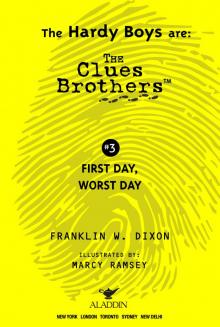 First Day, Worst Day
First Day, Worst Day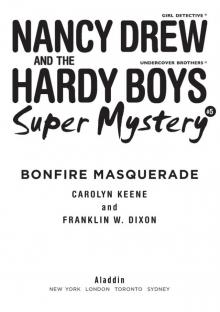 Bonfire Masquerade
Bonfire Masquerade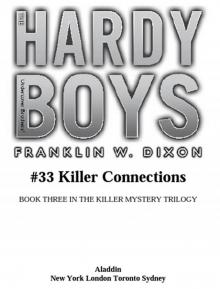 Killer Connections
Killer Connections Strategic Moves
Strategic Moves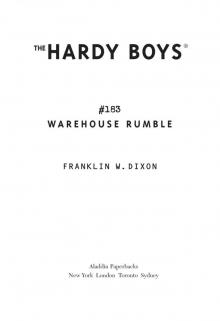 Warehouse Rumble
Warehouse Rumble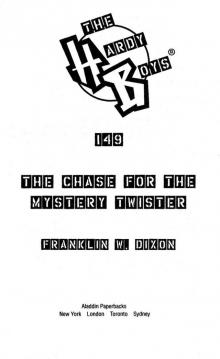 The Chase for the Mystery Twister
The Chase for the Mystery Twister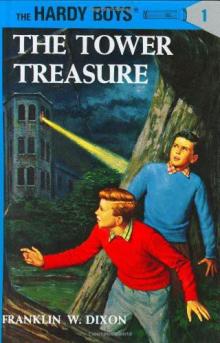 The Tower Treasure thb-1
The Tower Treasure thb-1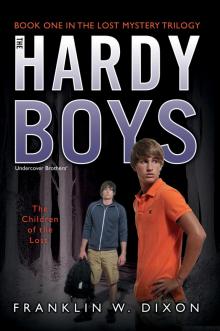 The Children of the Lost
The Children of the Lost The Last Laugh
The Last Laugh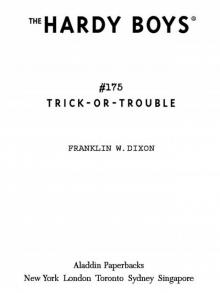 Trick-or-Trouble
Trick-or-Trouble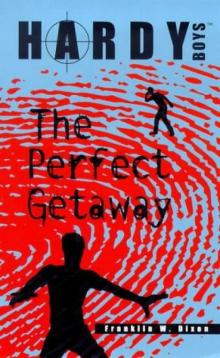 Perfect Getaway
Perfect Getaway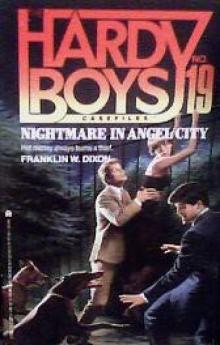 Nightmare in Angel City
Nightmare in Angel City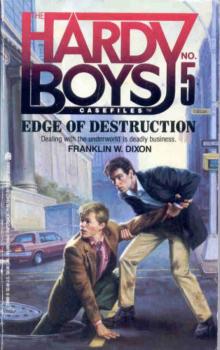 Edge of Destruction
Edge of Destruction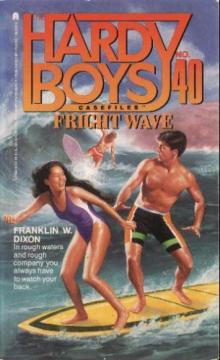 Fright Wave
Fright Wave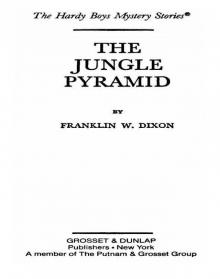 The Jungle Pyramid
The Jungle Pyramid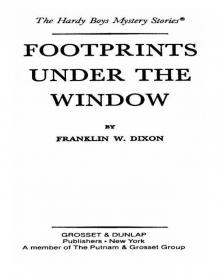 Footprints Under the Window
Footprints Under the Window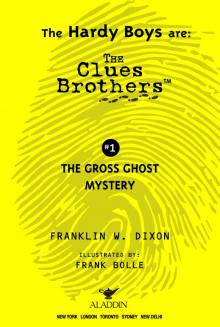 The Gross Ghost Mystery
The Gross Ghost Mystery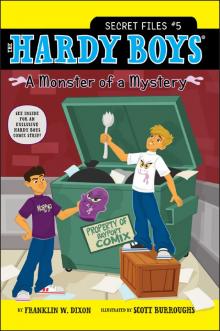 A Monster of a Mystery
A Monster of a Mystery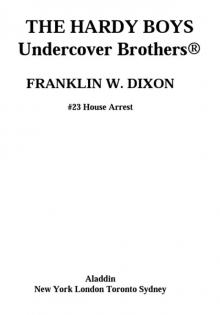 House Arrest
House Arrest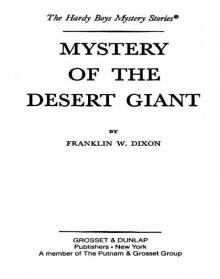 Mystery of the Desert Giant
Mystery of the Desert Giant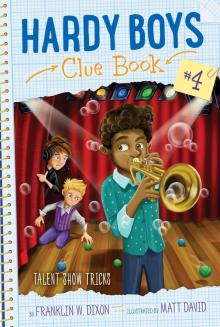 Talent Show Tricks
Talent Show Tricks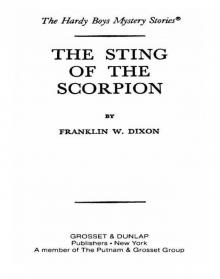 The Sting of the Scorpion
The Sting of the Scorpion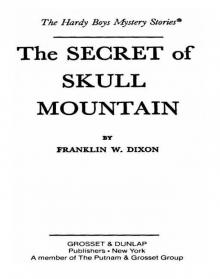 The Secret of Skull Mountain
The Secret of Skull Mountain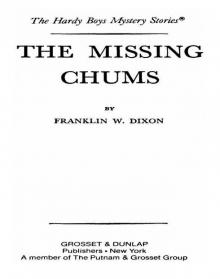 The Missing Chums
The Missing Chums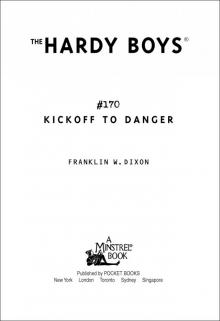 Kickoff to Danger
Kickoff to Danger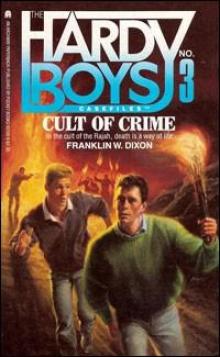 Cult of Crime
Cult of Crime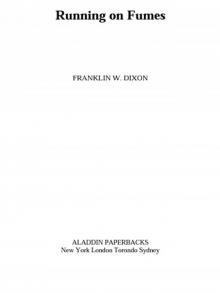 Running on Fumes
Running on Fumes Martial Law
Martial Law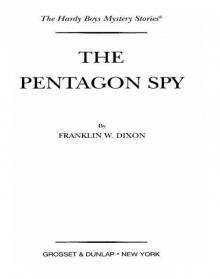 The Pentagon Spy
The Pentagon Spy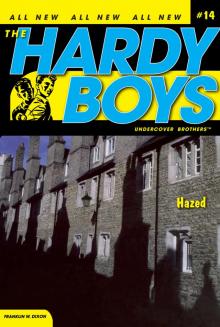 Hazed
Hazed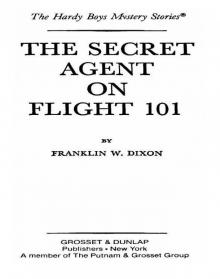 The Secret Agent on Flight 101
The Secret Agent on Flight 101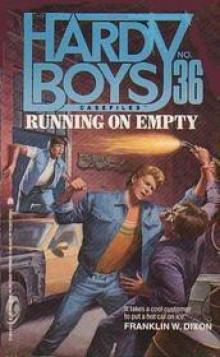 Running on Empty
Running on Empty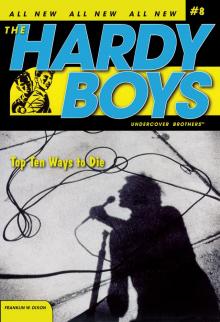 Top Ten Ways to Die
Top Ten Ways to Die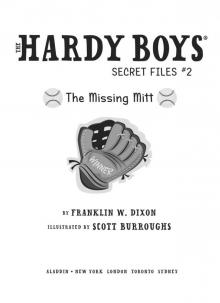 The Missing Mitt
The Missing Mitt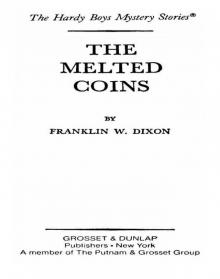 The Melted Coins
The Melted Coins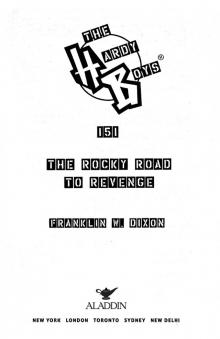 The Rocky Road to Revenge
The Rocky Road to Revenge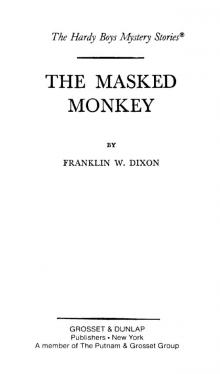 The Masked Monkey
The Masked Monkey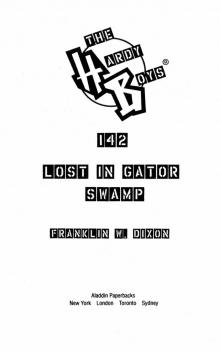 Lost in Gator Swamp
Lost in Gator Swamp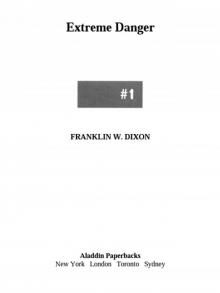 Extreme Danger
Extreme Danger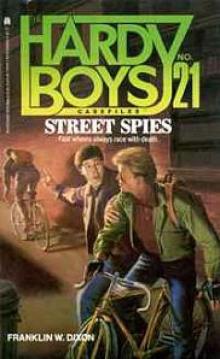 Street Spies
Street Spies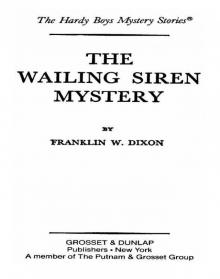 The Wailing Siren Mystery
The Wailing Siren Mystery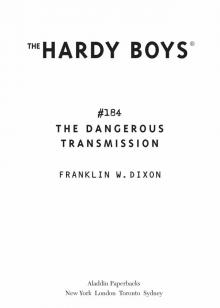 The Dangerous Transmission
The Dangerous Transmission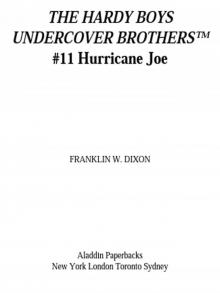 Hurricane Joe
Hurricane Joe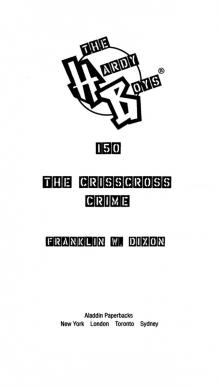 The Crisscross Crime
The Crisscross Crime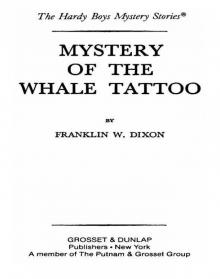 Mystery of the Whale Tattoo
Mystery of the Whale Tattoo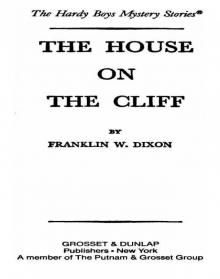 The House on the Cliff
The House on the Cliff Camping Chaos
Camping Chaos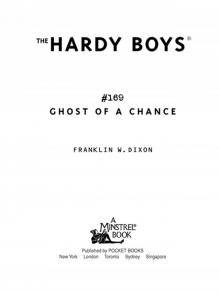 Ghost of a Chance
Ghost of a Chance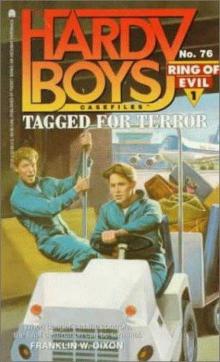 Tagged for Terror
Tagged for Terror Thrill Ride
Thrill Ride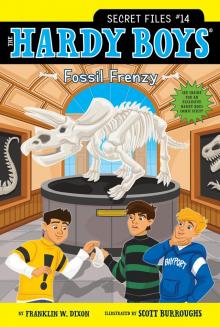 Fossil Frenzy
Fossil Frenzy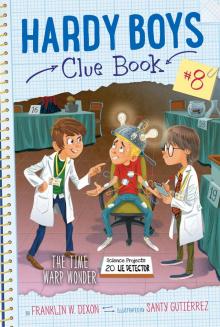 The Time Warp Wonder
The Time Warp Wonder Ghost Stories
Ghost Stories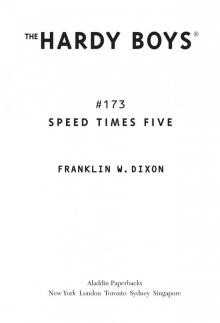 Speed Times Five
Speed Times Five What Happened at Midnight
What Happened at Midnight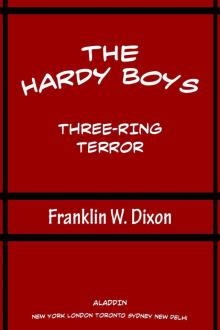 Three-Ring Terror
Three-Ring Terror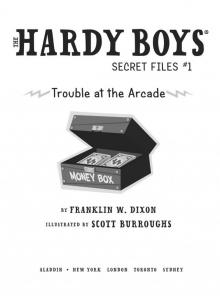 Trouble at the Arcade
Trouble at the Arcade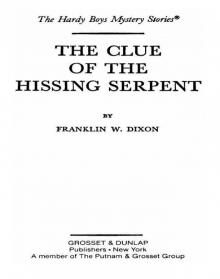 The Clue of the Hissing Serpent
The Clue of the Hissing Serpent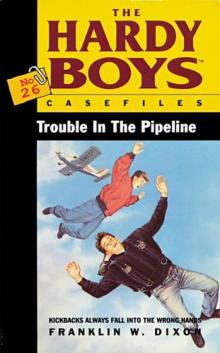 Trouble in the Pipeline
Trouble in the Pipeline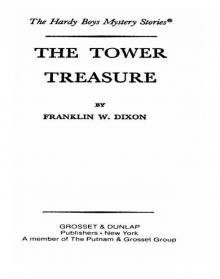 The Tower Treasure
The Tower Treasure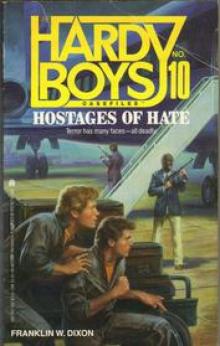 Hostages of Hate
Hostages of Hate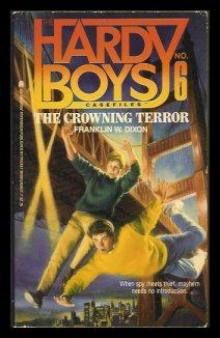 The Crowning Terror
The Crowning Terror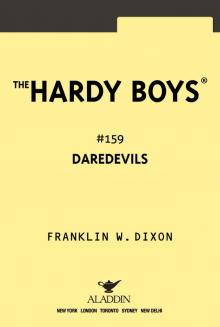 Daredevils
Daredevils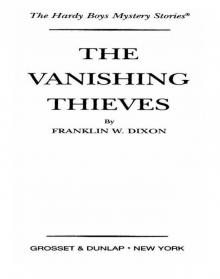 The Vanishing Thieves
The Vanishing Thieves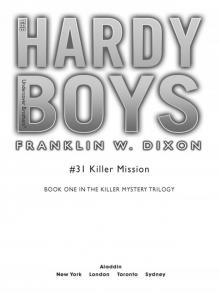 Killer Mission
Killer Mission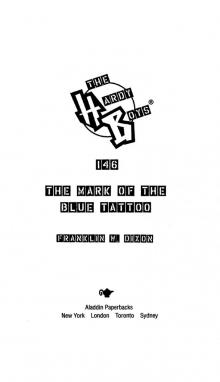 The Mark of the Blue Tattoo
The Mark of the Blue Tattoo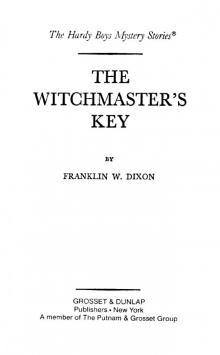 The Witchmaster's Key
The Witchmaster's Key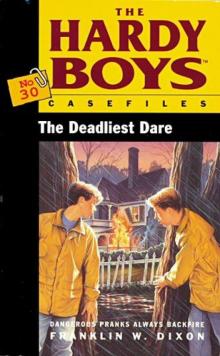 The Deadliest Dare
The Deadliest Dare Peril at Granite Peak
Peril at Granite Peak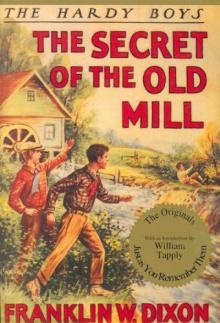 The Secret Of The Old Mill thb-3
The Secret Of The Old Mill thb-3 Rocky Road
Rocky Road The Demolition Mission
The Demolition Mission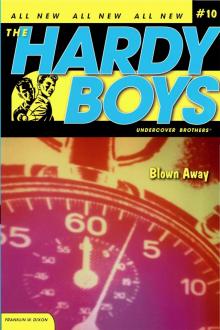 Blown Away
Blown Away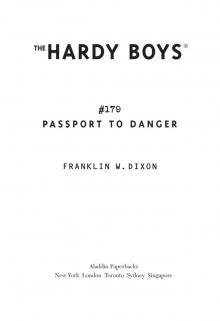 Passport to Danger
Passport to Danger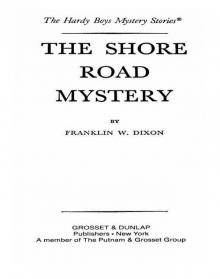 The Shore Road Mystery
The Shore Road Mystery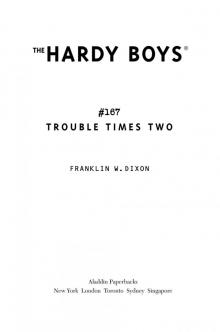 Trouble Times Two
Trouble Times Two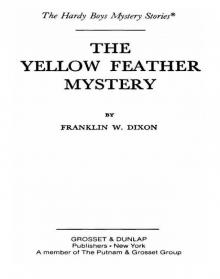 The Yellow Feather Mystery
The Yellow Feather Mystery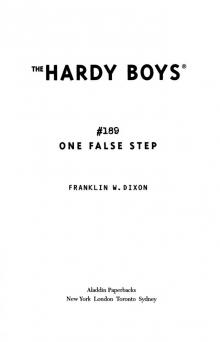 One False Step
One False Step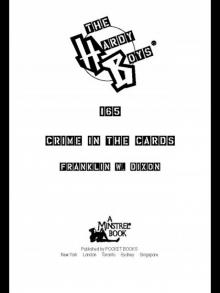 Crime in the Cards
Crime in the Cards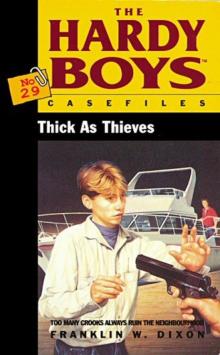 Thick as Thieves
Thick as Thieves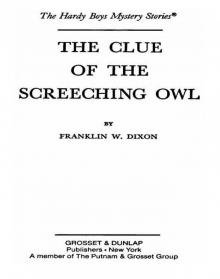 The Clue of the Screeching Owl
The Clue of the Screeching Owl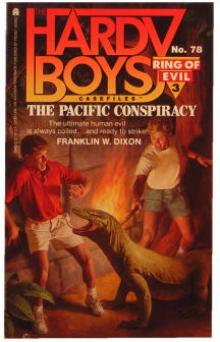 The Pacific Conspiracy
The Pacific Conspiracy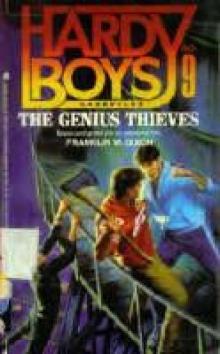 The Genius Thieves
The Genius Thieves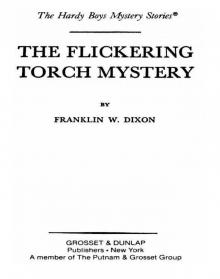 The Flickering Torch Mystery
The Flickering Torch Mystery Into Thin Air
Into Thin Air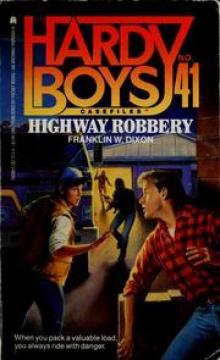 Highway Robbery
Highway Robbery Deadfall
Deadfall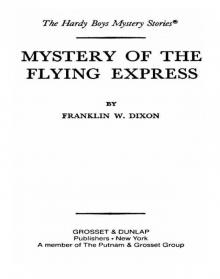 Mystery of the Flying Express
Mystery of the Flying Express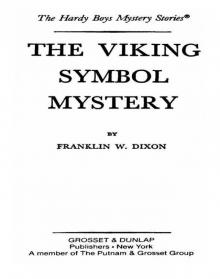 The Viking Symbol Mystery
The Viking Symbol Mystery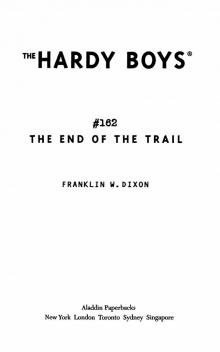 The End of the Trail
The End of the Trail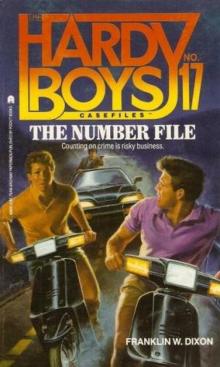 The Number File
The Number File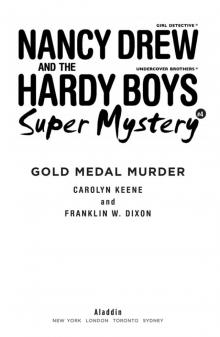 Gold Medal Murder
Gold Medal Murder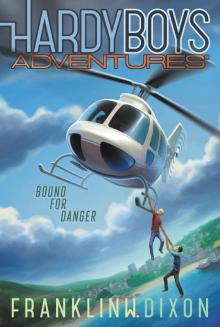 Bound for Danger
Bound for Danger Collision Course
Collision Course The Madman of Black Bear Mountain
The Madman of Black Bear Mountain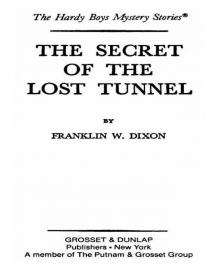 The Secret of the Lost Tunnel
The Secret of the Lost Tunnel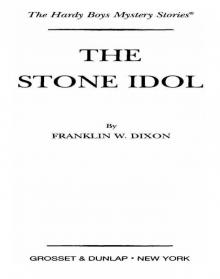 The Stone Idol
The Stone Idol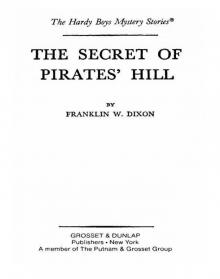 The Secret of Pirates' Hill
The Secret of Pirates' Hill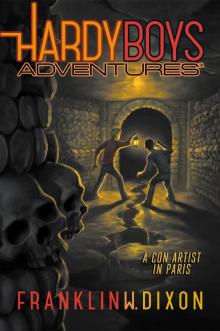 A Con Artist in Paris
A Con Artist in Paris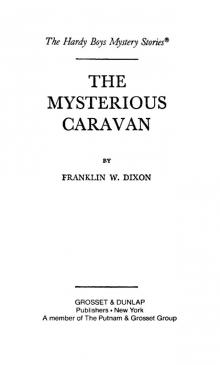 The Mysterious Caravan
The Mysterious Caravan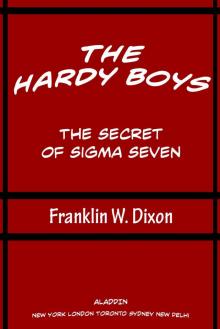 The Secret of Sigma Seven
The Secret of Sigma Seven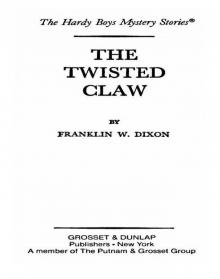 The Twisted Claw
The Twisted Claw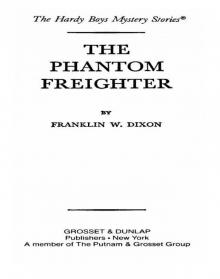 The Phantom Freighter
The Phantom Freighter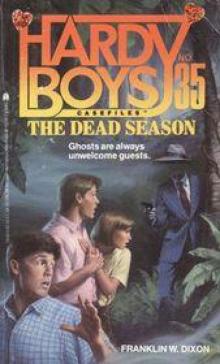 The Dead Season
The Dead Season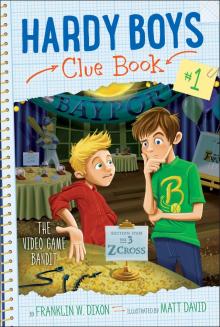 The Video Game Bandit
The Video Game Bandit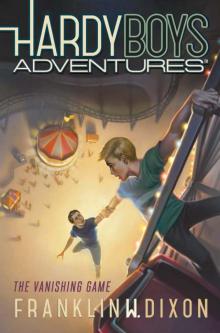 The Vanishing Game
The Vanishing Game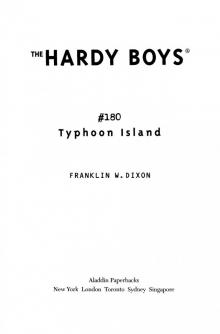 Typhoon Island
Typhoon Island